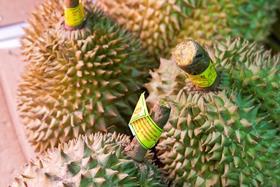
Thailand’s trade negotiations department has released figures showing a rise in shipments of fruit and vegetables to China between January and May this year.
The department told theBangkok Postthat shipments in the first five months of 2019 rose by 31 per cent, year-on-year, to US$1.2bn.
A drop in the value of vegetable exports over this period was countered by a significant rise in the value of fruit exports, resulting in an overall rise for the category.
Fruit exports contributed US$838.61m to the total, up 123 per cent. Durian accounted for the largest export volume, making up 48.5 per cent of fruit shipped followed by longan, mangosteen and young coconut.
Vegetable exports were down 33 per cent in the first five months of the year, contributing US$361.08m the total value. Cassava represented 96 per cent of vegetable exports.
Auramon Supthaweethum, director-general of the trade negotiations department, said the country's fresh produce trade was still seeing the benefits of the Asean-China Free Trade Area which was introduced in 2003.
'This agreement is such an important tool for Thailand in order to create advantages for farmers and exporters,'Auramon told the Bangkok Post.
'Before this agreement was effective in 2003, Thailand's trade surplus with China was only US$100.22m, but over the first five months, the country's trade surplus rose to US$854.75m.'
The fresh produce shipped by Thailand to China must comply with requirements surrounding food safety, quality, pesticide residue and agricultural pests, the department urged growers to ensure they meet these standards.
'The department calls on Thai farmers and growers to comply with these measures and standards in order to maintain quality and competitiveness,”she said.
'They have to register their farms and plantation areas while their facilities for processed fruits and vegetables have to be traceable if they find problems.'



